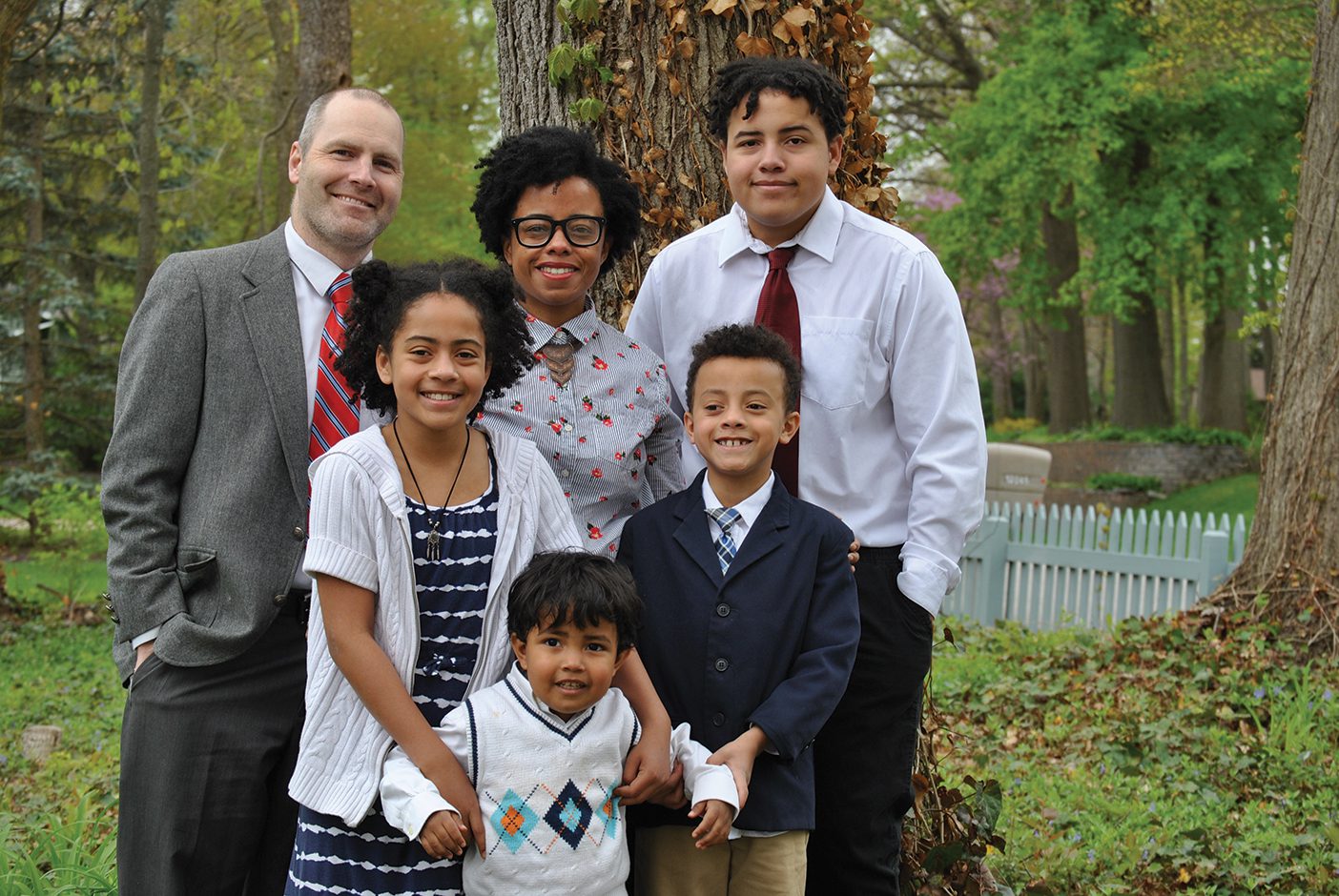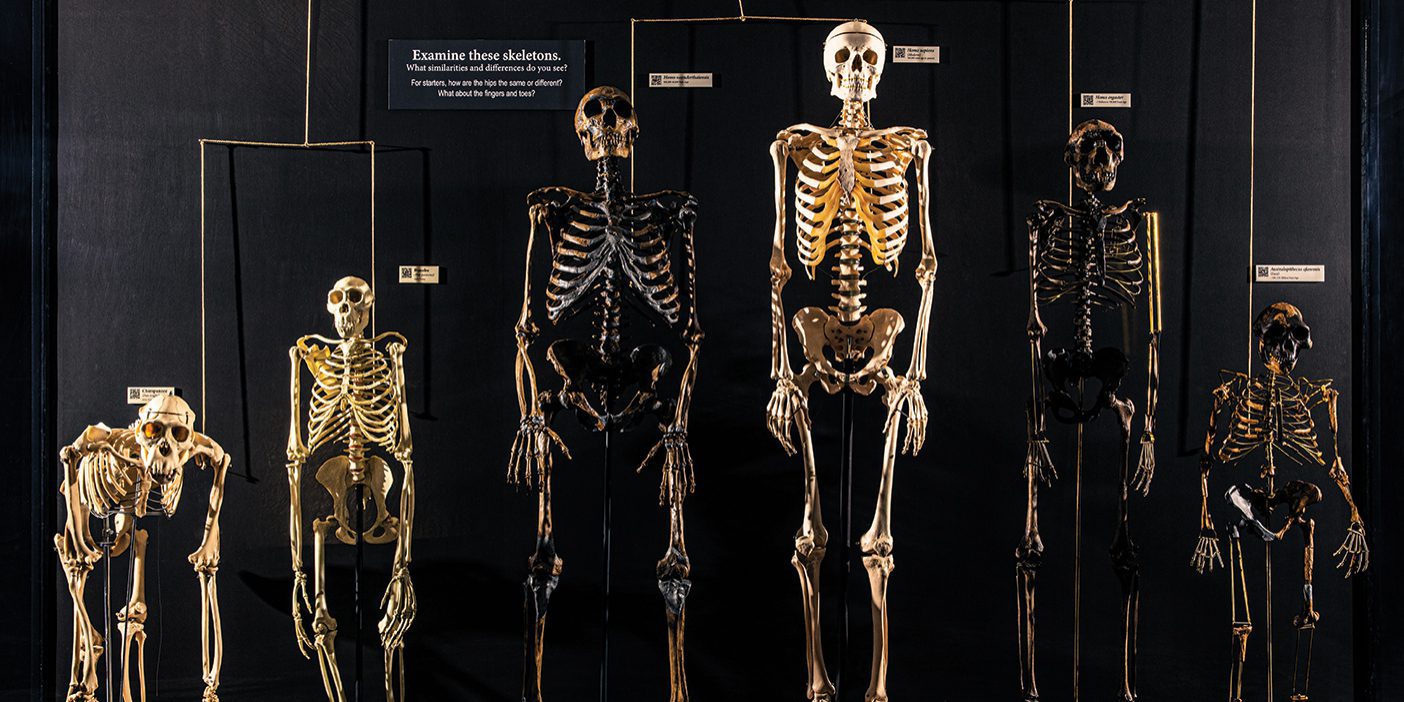A BYU alumna manages to defy easy categorization.

Few people can claim that a 3 a.m. prank phone call changed their life, but for La Donna Pratt Forsgren (MA ’05), heaven had the last laugh. La Donna and her sister, Monica, had seen a late-night ad for a free copy of the Book of Mormon. And so they ordered one as a joke. “We thought we were so incredibly funny—until two missionaries showed up,” Forsgren says. This odd introduction to the Church led to her baptism at age 17 and eventual temple marriage.
Today a Latter-day Saint professor at Catholic Notre Dame University, Forsgren lives on the cusp of many identities. Raised in poverty, she is now an academic; she is an African-American woman married to a Caucasian man; naturally shy and introverted, she stands up in front of students. Her own experience defying stereotypes helps her reach out to the marginalized and forgotten.
As one of 10 daughters raised by a single mother in Oregon, Forsgren dreamed of someday being a teacher. She and her sisters would play “school” during the summer: “Monica and I would act as schoolteachers while our sisters performed as our students. [We] transformed our bedroom into a schoolroom by turning our dresser around and using it as a chalkboard. We couldn’t afford chalk, so we used rocks to write on the board and teach the lessons.”
With financial and familial odds stacked against her, La Donna’s educational dreams seemed out of reach. “I had been homeschooled since middle school so that I could babysit my niece,” Forsgren recounts. Feeling stuck, she decided to get her GED and entered college at 16. But when she began at Western Oregon University, she discovered she had no idea how to “handle the academic rigors” of student life. “In fact,” she admits, “I did not know how to turn a computer on.”
After a year of college, Forsgren moved home for the summer and met the missionaries. She accepted the doctrine without question and was baptized in September 1999 just before returning to college for her sophomore year.
While finding the gospel was a turning point in her life, it was also a source of new challenges. “I thought I could attend parties, go out with friends, [and] live a typical college lifestyle,” says Forsgren. “Within nine months I realized I could not keep my baptismal covenants and live a similar lifestyle as my friends.” Depressed and lonely, she seriously contemplated leaving the Church.
When summer came again, Forsgren decided to read the Book of Mormon cover to cover to find out if it was true. She explains: “When I finished, I turned to the Doctrine and Covenants and came across what has become my favorite scripture: ‘Be patient in afflictions, for thou shalt have many; but endure them, for, lo, I am with thee, even until the end of thy days’ (D&C 24:8).” Forsgren says her Heavenly Father’s love got her through those hard times. And by her junior year, she was earning mostly As and began considering graduate school.
Wanting to attend a rigorous program surrounded by faithful members of the Church, and at the recommendation of an advisor, Forsgren began a master’s in theatre and media arts at BYU. It was there that she met theatre-arts-studies professor Megan Sanborn Jones (BA ’95), who drastically shaped her view of how to manage competing identities. “She became my first example of a faithful member who was also an artist, scholar, and mother. I realized at that point that the intersections of my identity were not irreconcilable.” Sanborn Jones encouraged Forsgren to continue her education and study black theater. And so in a Northwestern University doctoral program, she studied the Black Arts Movement (1965–76), which arose in response to the turbulent socio-political environment that existed in the United States during the 1960s.
“I realized . . . that the intersections of my identity were not irreconcilable.” —La Donna Forsgren
In her PhD program some criticized Forsgren for choosing to have children while she studied. “When I began, I had a toddler who hadn’t yet been diagnosed with autism spectrum disorder. By the completion of my PhD, I had three children, including a newborn,” Forsgren recounts. She says the lack of support and respect for her choices and beliefs added to her burden, even leading her to try to hide her pregnancies to avoid criticism from certain faculty members.
The pressure on Forsgren became extreme during her comprehensive exams: three tests, three hours each, over three days. When testing ended, Forsgren discovered, to her horror, that she had passed only one of them. She began to break down, thinking all was lost, but was given a second chance: three 10-page papers to be written in a week. After turning to the Lord in prayer, she was blessed with an overwhelming feeling of peace and love as she got to work. She ultimately passed and insists that it was Heavenly Father giving her “the knowledge to see beyond her own ability” that got her through.
As “an unapologetically black feminist and mother who works outside of the home,” Forsgren is used to feeling like she’s on the margins, especially among other Church members. She says she appreciates “wonderful bishops, Relief Society leaders, and everyday members who choose to celebrate differences, rather than ignore or belittle them.” She adds, “I often build friendships with other . . . people who defy easy categorization.”
Those friends include the women of the Black Arts Movement, who used poetry, theater, novels, and visual arts to emphasize and affirm their historical and cultural roots. Though the movement had a large impact on society, many of the artists from the Black Arts Movement, particularly women, are not broadly known—something Forsgren is working to change. She has recorded thousands of pages of history that will be archived and available for research.
Reaching out to gather oral histories was not easy for the naturally shy Forsgren. “My first interview, I was shaking,” she recalls. But these forgotten artists were caught off guard and touched to receive an interview request from a scholar. As Forsgren has been able to connect with them on personal levels as a mother and an artist, the women have become invested in her life and family. Some have offered to mentor her, while another offered to write a letter for her tenure and promotion file. Once, when Forsgren mentioned to an interviewee that her daughter enjoyed unicorns, she found, to her surprise, a giant stuffed unicorn mailed to her home several weeks later.
Her two books, In Search of Our Warrior Mothers: Women Dramatists of the Black Arts Movement and the upcoming Sistuhs in the Struggle: An Oral History of Black Arts Movement Theatre and Performance, pay homage to these women.
Now living her childhood dream as an educator, scholar, and mother, Forsgren has had to overcome countless stereotypes and criticisms to get there. “While it has not always been easy to . . . [be] a black woman intellectual, member of The Church of Jesus Christ of Latter-day Saints, mother, first-generation college student, and feminist scholar working at a Catholic institution—I feel deeply blessed to now be in a position to recover chapters of black history and culture, as well as mentor those who may also feel like they don’t belong.”












